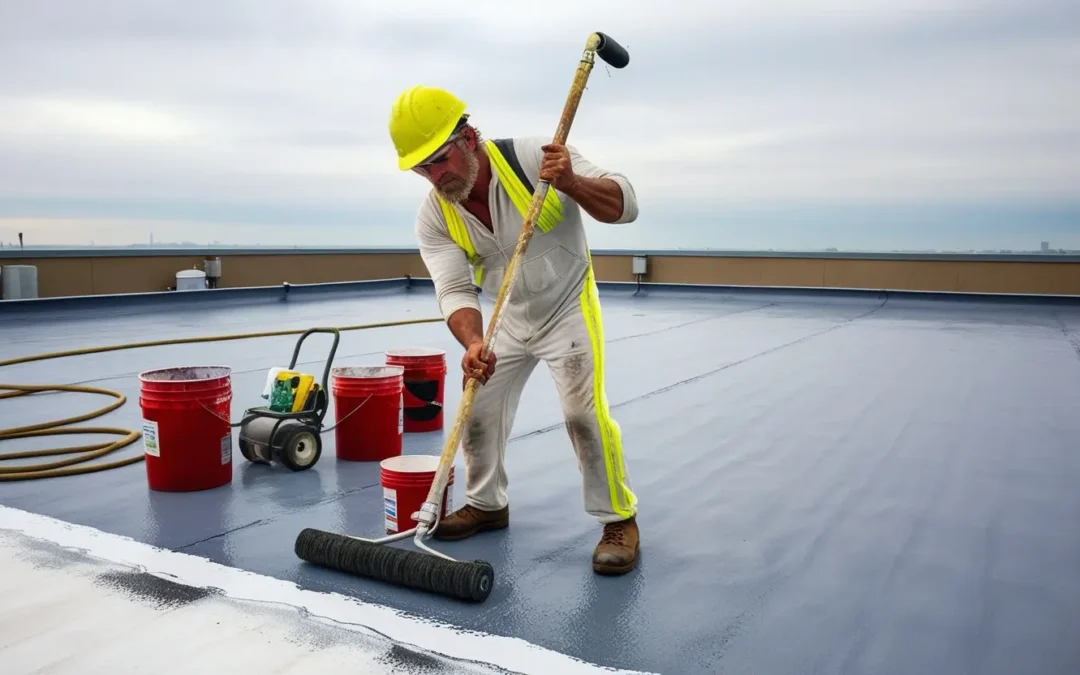Roof coatings have become an essential tool for commercial property owners looking to extend the lifespan of their roofs, improve energy efficiency, and reduce maintenance costs. But not all coatings are the same, and choosing the right one requires careful consideration of factors like climate, roof type, and performance goals. A well-selected coating can add years to your roof’s service life, while the wrong choice could lead to costly repairs or premature failure. Understanding the different options available and their specific benefits will help you make the best decision for your building.
Understanding the Purpose of Roof Coatings
Roof coatings serve as a protective barrier, shielding the existing roofing system from weather damage, UV exposure, and water infiltration. They are designed to enhance durability, improve energy efficiency, and, in many cases, eliminate the need for a full roof replacement. Coatings also help prevent leaks by sealing cracks and seams, reducing the likelihood of costly water damage.
One of the most significant benefits of roof coatings is their ability to reflect sunlight and reduce rooftop temperatures. This makes them particularly valuable for businesses looking to lower cooling costs during the summer months. However, not all coatings provide the same level of protection or energy efficiency, which is why selecting the right product is critical.
Types of Roof Coatings and Their Benefits
The best coating for your commercial roof depends on several factors, including the existing roofing material, weather conditions, and building needs. The four most commonly used commercial roof coatings are silicone, acrylic, polyurethane, and asphalt-based coatings, each with its own advantages.
Silicone coatings are one of the most popular choices for flat and low-slope roofs, particularly in areas with heavy rainfall or ponding water issues. Silicone is highly resistant to moisture, meaning it won’t degrade as quickly as other coatings when exposed to standing water. It also provides excellent UV protection, making it a great option for buildings looking to improve energy efficiency.
Acrylic coatings are water-based and highly reflective, making them a cost-effective solution for reducing cooling costs. They perform well in climates with high sun exposure, helping to lower rooftop temperatures and extend the life of the roofing system. However, acrylic coatings are not as resistant to ponding water as silicone, which means they are better suited for roofs with proper drainage.
Polyurethane coatings are known for their durability and impact resistance, making them an excellent choice for roofs with high foot traffic or areas prone to physical damage. These coatings are often used in industrial settings where mechanical equipment is frequently serviced. Polyurethane also offers strong resistance to water, but it typically requires a top coat to maximize UV protection.
Asphalt-based coatings, such as aluminized coatings, are commonly used on built-up and modified bitumen roofs. They provide good waterproofing properties and UV resistance while maintaining compatibility with traditional roofing materials. These coatings are a reliable choice for restoring aging asphalt-based roofs without the need for a full replacement.
Factors to Consider When Selecting a Roof Coating
Choosing the right roof coating involves more than just selecting a product—it requires evaluating your specific roofing system and performance goals. One of the first factors to consider is the condition of your existing roof. If your roof has extensive damage or structural issues, a coating may not be a sufficient solution, and a more comprehensive repair or replacement may be needed.
Climate also plays a major role in coating selection. In areas with high rainfall and humidity, silicone or polyurethane coatings provide better moisture resistance than acrylic. Conversely, in locations with intense sun exposure, a highly reflective acrylic or silicone coating may be the best choice for improving energy efficiency.
Additionally, consider the level of maintenance your building requires. Some coatings, like silicone, require less maintenance over time, while others may need periodic reapplication to maintain their effectiveness. Working with an experienced commercial roofing contractor ensures that you select the right coating for your roof’s specific conditions and longevity goals.
Work with a Roofing Expert to Get the Best Results
Applying a roof coating is an investment that can significantly extend the life of your roof and reduce operational costs—but only if done correctly. Proper surface preparation, application techniques, and material selection all impact the performance and longevity of the coating. Working with a knowledgeable roofing professional ensures that your roof receives the right treatment and long-term protection.
At Cipollini Roofing, we help businesses choose and apply the best roof coatings for their specific needs. Whether you’re looking to enhance energy efficiency, protect against leaks, or extend the life of your commercial roof, our team is here to provide expert guidance and professional installation. Contact us today to discuss your roof coating options and find the right solution for your building.


